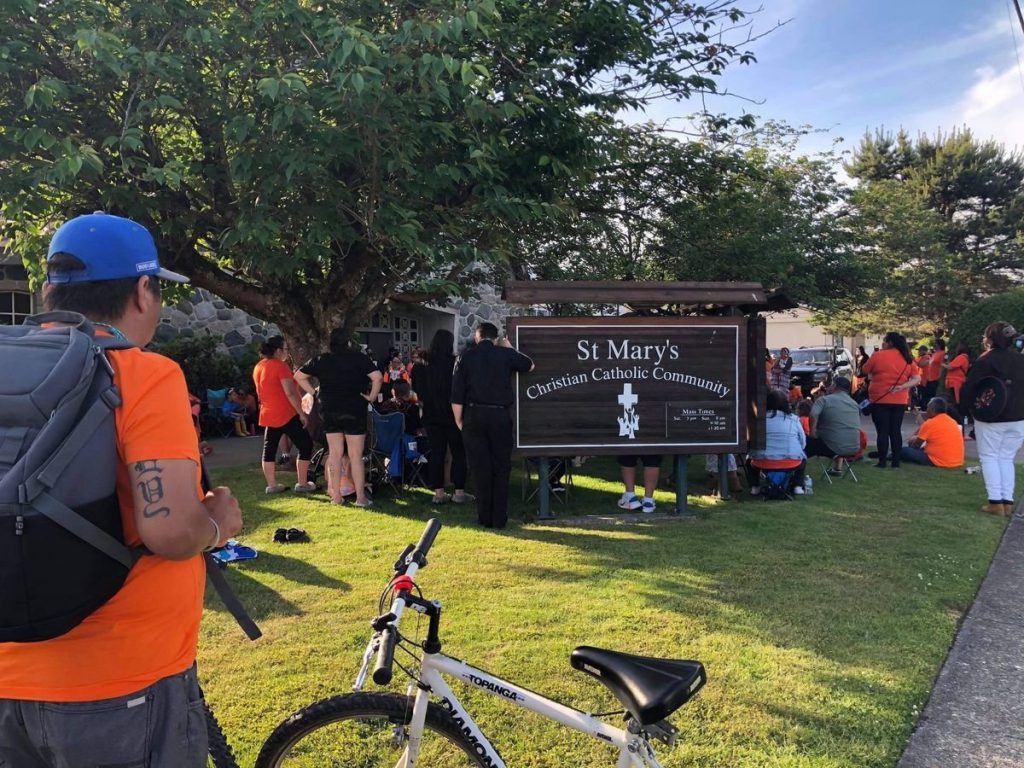I’d like to talk about the current situation surrounding the Kamloops Indian Residential School with a view towards truth and reconciliation. Keep in mind that I’m only addressing you, the parishioners of St. Anthony’s.
But, since some people have asked me about my thoughts, I’ll do so briefly.
[Watch Fr. Justin’s homily delivery here.]
This photo of First Nations people gathering at St. Mary’s in Chilliwack on May 30, 2021 means a lot to me, because I was assigned there from 2006 to 2008:
They honoured the 215 children who had died in Kamloops, gave speeches, and grieved. It brings back memories of ministering to First Nations Catholics in Chilliwack, and hearing their long-standing pain. So, now, it hurts to see people hurting again.
My mind has also gone back to 2009, when Chief Phil Fontaine went to Rome and met Pope Benedict XVI. I remember being so happy for the First Nations people, because they needed and deserved that meeting. They needed to hear that the Holy Father loves them and is sorry for what Catholics did to them. That happiness and peace are what I want for them again.
Other thoughts that come to mind are: We’ve brought this upon ourselves by being unfaithful to Jesus; I’m shocked how some Catholics could accept children being taken away from their parents—that’s against the natural law, so it’s mindboggling how people didn’t recognize it; and even though the federal government and others were involved in residential schools, we’re held to a higher standard, and should be because we are Jesus’ Church.
Our lens for looking at residential schools and the deeper issues will be today’s Gospel, about the disciples in the boat being tossed about by waves.
Now some people aren’t tossed about by waves: They’ve been focused on the truth of residential schools for a long time, advocating for healing, records being released, and even asking the Pope to apologize.
But many people, including some of us, focus not on what’s true, but on what’s expedient.
The first statement of the Canadian Conference of Catholic Bishops on May 31, 2021 was expedient, but beyond sorrow, prayers, and a pledge to seek reconciliation, it didn’t offer anything concrete. Compare that with Archbishop Miller’s statement, which is clear in its five areas of action and accountability—I’m not saying that because he’s my superior, but because I think it’s true. On the other hand, one priest expressed great empathy for First Nations peoples and said many true things, but then complained about Church teachings with which he disagrees—that’s popular with our culture, but doesn’t help healing.
Many focus on the horrors of residential schools like it’s something new (which is expedient), but, The Truth and Reconciliation Commission, since 2008, has been advocating for 94 Calls to Action, and six months ago, Commissioner Chief Wilton Littlechild said, “I’m encouraged by what I’ve seen going on across the country… But on the other hand, we’re collectively quite concerned that it’s been moving too slow”—why haven’t we been following that story?
People express outrage and want the Church to apologize, but “all of the dioceses that had residential schools and the religious orders involved apologized decades ago, and those expressions have been renewed in recent days”. Now, if people are asking the Sisters of St. Ann or the Oblates of Mary Immaculate to release records, or that Pope Francis apologize and come to Canada and do so, then be specific. The Truth and Reconciliation Commission in 2018 asked Pope Francis to come and apologize—that’s a fair request, which I think would be healing. However, in the midst of outrage dispersed in so many directions, some of which isn’t true, these good requests get lost. It’s been shown, for example, that people who have followed the situation in residential schools always knew about the graves of children at residential schools, and that the Kamloops Residential School did not have a ‘Mass grave’.
What I’m criticizing is a bandwagon mentality, where people join the latest trendy cause, and the focus is not on truth or reconciliation. I question how many of us really care about the First Nations people and their healing. We do care, but it seems it doesn’t last long.
Let’s root ourselves in the Gospel, because Jesus Christ is the truth: “And leaving the crowd behind, they took Jesus with them in the boat, just as he was… A great windstorm arose, and the waves beat into the boat, so that the boat was already being swamped. But Jesus was in the stern, asleep on the cushion” (Mk 4:35-38). Jesus shows “perfect trust in God that is often signified in Scripture by a peaceful and untroubled sleep” (Mary Healy, The Gospel of Mark in Catholic Commentary on Sacred Scripture, 95). He’s tossed about by the waves, but they don’t disturb Him.
Now let’s make a distinction: Evil should disturb us. It should still shock us that First Nations children were forcibly taken from their parents’ homes and abused, forbidden to speak their native language and practice their traditions. But hearing these things should not move us into a frenzy. Frenzy asks, “How could God allow this?” as if it’s a new question. But evil has been happening forever: the Holocaust, the Cultural Revolution in China, or the Holodomor in Ukraine. But when things are going well in our lives, we ignore this question. Frenzy means writing things on social media, such as, “Why hasn’t the Catholic Church apologized?” and then, a day later writing, “Here’s their apology.” Frenzy means going along with the latest trendy moral cause. Now, we should all stand up against evil, but there’s something questionable when the focus of our attention shifts every year. Right now, it’s residential schools; in 2020, it was George Floyd and Black Lives Matter, but now it’s not as big a story. In 2019, it was the impeachment of President Trump. In 2018, it was wildfires in California, making climate change our big focus. Remember 2015, when the photo of a Syrian child refugee whose body washed on the shore? Immediately, that was the big election issue. The Syrian Civil War has been going on for ten years, but it’s no longer the focus. What will come next? What will take our attention away from finding truth and reconciliation regarding First Nations? So, do we really care? If there’s a spike in COVID-19 cases, we’ll turn our attention away from them. If there’s a school shooting, our next focus will be gun control.
In his letter to the Ephesians, St. Paul writes about reaching spiritual maturity, “so that we may no longer be children, tossed back and forth and carried about with every wind of doctrine, by the cunning of men, by their craftiness in deceitful wiles” (Eph 4:14). That’s how many of us are: We are tossed about by the latest tragedy.
Has everyone heard of ‘outrage culture’? “At New York University, psychologist Jay Van Bavel and his team have analyzed more than half a million tweets, specifically those that used moral and emotional language… Van Bavel found lots of words generate outrage. Profanities are on the list; so are hate, war and greed… For every moral, emotional word that people use in a tweet, we found that it increased the rate of retweeting from other people who saw it by 15 to 20%.” People and the media know this. That’s why “sometimes anger seems to be the whole point. Anger draws Internet clicks, which is to say that many people now have a motive or even a business model for getting you mad”.
The only way to stay strong and achieve true healing and reconciliation is to stay rooted in the truth, which is Jesus. In 1996, Cardinal Ratzinger wrote, “Relativism has thus become the central problem for the faith at the present time”. The central problem in our world is relativism, which says that there is no truth, no moral absolutes. That’s why we always talk about abortion, the number one cause of death in the world, even when no one else talks about it.
But other injustices should also be fought, even when they’re not trendy. Last June, I mentioned the sins of Catholics with respect to Vatican scandals, sex abuse cover-ups, and residential schools. Why? Because I thought it was right. Even though they weren’t big stories then, I knew that people were still hurting from them, that it was right to acknowledge the tremendous evils done by Catholics in residential schools.
That brings us back to the Gospel: “And they woke him up and said to him, ‘Teacher, do you not care that we are perishing?’ He woke up and rebuked the wind, and said to the sea, ‘Peace! Be still!’ Then the wind ceased, and there was a dead calm. He said to them, ‘Why are you afraid? Have you still no faith?’” (Mk 4:38-41). About what kind of faith is Jesus talking? Here are three aspects:
1) Belief that Jesus is God. Jesus doesn’t ask God the Father to calm the storm, but does it Himself, because He is God. When scandals like this erupt, is your faith shaken? Why? Did Jesus ever promise us that there would be no suffering, no scandals? Since when is our faith based on bishops?
I feel the need to tell those of you who have been in our parish family for a few years now that your faith must mature. Ever since I got here, I’ve given at least one homily a year on scandals in the Church, saying that this has been going on since the time of the apostles.
2) If we believe in Jesus, then we’ll believe in the Church, because He founded her. I’ve covered this in other homilies. It’s too convenient for people to say, “I believe in Jesus, but not the Church.” How can you say, “I love the King, but I hate His kingdom”?
We’re Catholic not because of the Pope, or how good other Catholics are to us, but because it’s Jesus’ Church.
Remember I told you about the dream of St. John Bosco, who saw the Church represented as a ship, and the goal was to get this ship between two pillars, one of the Eucharist, and one of Mary? If someone leaves the Church, then they leave the Eucharist, which is Jesus.
It’s very understandable that survivors of abuse by priests and sisters leave the Church; they are so wounded they need to get away from anything connected to their suffering. What’s truly amazing is when survivors choose to remain Catholic. What’s more amazing is that they stay close to Jesus while criticizing what needs to be criticized in the Church: They speak up and hold bishops and priests accountable.
3) Faith is reasonable, not just emotional. I’ve mentioned before that we live in the age of feelings. If mediaeval times were the age of faith, then there was the so-called age of reason, now we’re in the age of feelings. And so our faith is primarily guided by how we feel. Why don’t we pray? “It’s so hard.” Why do we give up? Because we feel discouraged. Why do media stories move us into a frenzy? Because we think with our feelings.
However, as we talked about in April of this year, faith is rational and rooted in evidence. We believe in Jesus and the Church because the evidence points us there, and then we choose to trust. And when our shepherds let us down and we’re disappointed, our faith stands firm.
Jesus wants us to be persons of faith, meaning we acknowledge Who He is, trust in Him, obey His teachings, seek the truth, and truly love people—that’s the only way we’ll survive. This is our choice, but talk to Him, ask for grace, and tell Him your decision. I’m inviting you today to make a jump from immature to adult faith.
If we do, we’ll be more rooted in the truth. And when people bring up the residential schools and say, “Man, the Catholic Church has done horrible things,” then agree with them! I’d say, “Yeah. But, let’s be specific: Many Catholics have done horrible things. Not all Catholics have.” Always agree with truth. If you do, you have nothing of which to be afraid.
And, if they go on about our faults, if it’s true, then agree. But, if it’s false, then disagree. If they say, “Why are you still Catholic?” Then tell them, it’s because Jesus is God and He founded the Church.
At that impromptu gathering in Chilliwack, I saw faith, truth, and steps towards healing and justice. Fr. Juan Lucca apologized on behalf of the Church, talked to each person individually, apologizing, thanking them for persevering, and sharing their story.
Keep on following the needs of the First Nations peoples, not just when it’s in the news, but into the future; and do what you can to help. We must root ourselves in Jesus, keep the faith, love like Him, and this will lead to truth and reconciliation.




